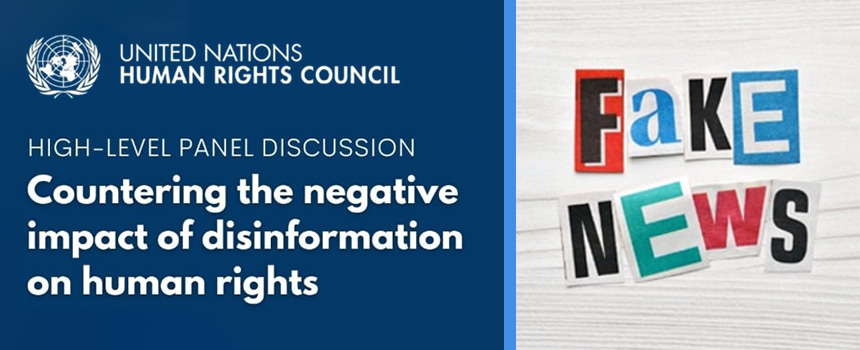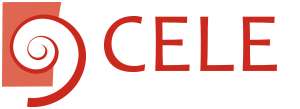Panel de Alto Nivel del Consejo de Derechos Humanos de la ONU

El pasado 28 de junio de 2022, la Directora del CELE, Agustina Del Campo, participó del panel “Combatiendo el Impacto Negativo de la Desinformación en los Derechos Humanos'', organizado en el marco de las sesiones del Consejo de Derechos Humanos de la ONU en Ginebra. El panel estuvo constituido por la Relatora de Libertad de Opinión y Expresión de la ONU, Sra. Irene Khan, quien se refirió principalmente a las conclusiones de su informe de 2021; la Directora del CPSL (Content Policy and Society Lab) de Stanford y miembro del Oversight Board de Facebook, Julie Owono, quien habló de las medidas que las empresas deberían tomar frente a la desinformación y las decisiones del OB de Facebook sobre el tema; la profesora Kate Jones del Oxford Internet Institute, quien destacó la necesidad de generar espacios para abordar este tema desde una perspectiva multisectorial y la importancia de encarar recomendaciones respetuosas de derechos humanos.
A continuación la transcripción de las reflexiones que compartió Agustina Del Campo con el panel:
“Good afternoon, your excellencies, ladies and gentlemen. I would first like to thank the UN Council for this invitation. I would also like to thank the States, particularly those sponsoring resolution 49/21 that convened this panel and framed the topics of our conversation today, civil society, academics and private company’s representatives that are taking part or following this panel.
As the Council has already noted in its resolution 49/21 there is increasing concern over “the far- reaching negative impact on the enjoyment and realization of human rights of the deliberate creation and dissemination of false or manipulated information intended to deceive and mislead audiences, either to cause harm or for personal, political or financial gain”.[1] Disinformation has been at the center of multiple academic, State, and civil society sponsored debates over the past years and the concern has only been exacerbated by crisis situations, most prominently the health crisis generated by the COVID 19 pandemic.
Unlike other panels and for addressing this issue, this panel has been asked to address the role of the States in combating harmful disinformation, while recognizing that “disinformation requires multidimensional and multi-stakeholder responses that are in compliance with international human rights law (...) and that States are in a unique position to promote and facilitate cooperation among the involved parties.”[2]
I have argued elsewhere that “the disinformation dilemma encompasses complex issues and that it speaks to cultural, institutional, political and legal strengths and weaknesses”[3] within each State. While we all agree that disinformation is not new, the grouping of legal and illegal types of speech and content that are today gathered under the “disinformation umbrella” is. This grouping of radically different categories of speech, some legal and other illegal, some capable of generating criminal liability, others within the ethical realm, may be one of the harder challenges to tackle it appropriately. And attempts to consolidate this umbrella term in legislation and policy has already created irreconcilable conflicts from a freedom of expression point of view. As Ms. Khan’s report highlights, recent bills and legislations crafted to deal with this phenomenon are vague and unable to precisely define the term to fully comply with the legality standard that any free speech restriction needs to meet. Furthermore, we’ve seen how in many countries existing over-broad legislation has been used to persecute and prosecute dissent under the guise of combating “disinformation.”
While finding an all-encompassing term to deal with lies may be convenient and even necessary to describe complex phenomena that impacts a single community (minorities for instance, who may be subject to different attacks that account for hate speech, defamation, negative propaganda, etc) or a single event (i.e. an election, where there may be voter disenfranchisement efforts, defamation of candidates, manipulation, etc), States’ attempts to legally respond to “disinformation” should first unpack the term, precisely to avoid overly broad legislation and/or arbitrariness in the implementation of existing legislation, which amount to censorship.
There are numerous rules and jurisprudence over libel and slander, criminal and civil liability for fraud, legal sanctions for misleading advertising and consumer protection clauses, international treaties, from Westphalia to the UN Charter, enacting the principle of non-intervention, etc. Furthermore, most democracies have also identified specific instances where the State may mandate individuals to speak the truth and punish them when they fail to deliver – i.e. witnesses in court proceedings, public officers vis a vis their work, commercial speech-. States have already done a prior, individual assessment of which lies constitute threats to their democracies or otherwise generate social harm and which ones should be tolerated to provide the conditions for self-government. Attempting to address all these categories in bulk threatens existing freedom of expression standards and ignores decades of legal and political thinking around legitimate limits to freedom of expression in democratic societies.
These too contribute to exacerbating an erosion to the rule of law and the necessary trust that must exist for democratic institutions to function, fostering polarization rather than procuring a human rights-based solution for the problem.
Still, the threats posed by disinformation campaigns to democracy and human rights require attention and State action. Data from CELE’s Legislative Observatory and our comparative law research show that most legislative initiatives around disinformation so far have been geared towards two main directions: criminalization of speech; and creating intermediary liability regimes whereby internet, especially social media companies, are obligated to actively detect and/or immediately block content that amounts to an ill-defined “disinformation” category. Some State initiatives that promote the implementation of upload filters, the use of automated detection and blocking of content, or the continuing pressure on companies to adopt standards for content moderation that the State cannot legitimately adopt itself, amount to mandated censorship, contrary to international human rights law.
Disinformation is not just any other content moderation category. Democratic societies assume the equal right of all citizens to think and speak their minds with the conviction that public discourse and governance benefit from such exchange of ideas and information of all kinds. As Professor Robert Post expressed “Indeed the most influential argument supporting the constitutional commitment to freedom of speech is the contention that speech is valuable because it leads to the discovery of truth.”[4]
And referring to academic freedom, he quotes “The function of seeking truths will sometimes mean…the undermining of widely or generally accepted beliefs.” If ideas and information are contrasted against a fixed, authoritative standard to be allowed, our quest for knowledge and its development will unavoidably be hindered. While there seems to be growing consensus on the need to tackle the dissemination of disinformation, the causes and sources of disinformation and how to address them have not received as much attention. And causes and sources of course may vary depending on the type of disinformation we are evaluating.
Professors Benkler, Faris and Roberts set out to demonstrate that social media and technology was responsible for the media crisis during the 2016 US Presidential elections. Instead, they concluded that “Instead of these technologically driven dynamics, which are novel but ultimately less important, we see longer-term dynamics of political economy: ideology and institutions interacting with technological adoption as the primary drivers of the present epistemic crisis”.”[5] Different authors have arrived at similar conclusions looking at very different countries with radically different norms, including researchers in Brazil, Italy and Colombia to name a few.
Ideology and institutions have also been directly signaled by many civil society representatives at the 13th session of the UN Forum on Minority Issues in 2020 among the most important threats. Although the forum was dedicated to social media and hate speech, and without disregarding the impact these technologies may have, the louder claim I came out with from those two days was that State sponsored hate speech was rampant and the cry for justice, accountability and enforcement of international commitments was deafening.
Therefore resolution 49/21 is so relevant and timely, particularly as it highlights the role of States as a source of disinformation as much as a key actor in finding potential solutions for the problem. States have two kinds of duties vis a vis the disinformation dilemma: First, States must respect human rights, refraining from infringing on anyone’s enjoyment of their fundamental rights, including freedom of speech and expression but also political rights, right to non discrimination, to economic, social and cultural rights, etc. States have a clear duty not to spread disinformation, particularly that which impacts vulnerable populations or undermines trust in democratic institutions. Second, they must guarantee human rights within their borders, and disinformation is threatening such guarantees.
It is a well-established principle and there is extensive jurisprudence establishing that Government officials have special duties vis a vis their public speech. The Interamerican Court for example in Perez Perozo v Venezuela stated:
“151. Certainly, in a democratic society it is not just legitimate but also, sometimes, a duty of the state authorities to make statements about issues of the public interest. Nevertheless, when doing so they have to verify reasonably, though not necessarily in an exhaustive manner, the truthfulness of the facts supporting their opinions,103 and this verification should be performed subject to a higher standard than that used by private parties, given the high level of credibility the authorities enjoy, the broad scope and possible effects their sayings may produce on certain sectors of the society and with a view to keeping citizens from receiving a distorted version of the facts.104 Furthermore, they should bear in mind that, as public officials, they are in a position of guarantors of the fundamental rights of the individual and, therefore, their statements cannot be such that they disregard said rights105 so that they must not amount to a form of interference with or pressure impairing the rights…. This duty of special care is particularly emphasized in those situations of greater social conflict, disorderly conducts or social and political bias, precisely because of the risks entailed for certain people or groups at a given time.”
The Colombian Constitutional Court eloquently summarized the same principle back in 2004 and later in 2012 framing public officials’ speech as a duty and a right. There are, according to the Court, political statements and opinions from public officials and there are communications that relate to the exercise of their mandated tasks. Public officials, particularly high ranked public officials, have a duty to communicate public interest information. Towards this latter communications, the Court establishes an even stricter standard than the Inter-American Court saying: “according to constitutional jurisprudence, the limits of the power/duty of communication of high ranked public officials with their constituencies require i) truth and impartiality as they convey information; ii) a minimum factual basis and reasonableness; and in every case, iii) respect for fundamental rights, especially for those that deserve special constitutional protection. (translation is mine) (En resumen, según la jurisprudencia constitucional, los límites del poder-deber de comunicación de los altos funcionarios públicos con la ciudadanía son (i) la veracidad e imparcialidad cuando transmitan información, (ii) la mínima justificación fáctica y la razonabilidad de sus opiniones y, en todo caso, (iii) el respeto de los derechos fundamentales, especialmente de los sujetos de especial protección constitucional. [6]
In a recent study we conducted with the Inter-American Institute on Human Rights we found that most countries in the Americas contemplate detailed legal and ethical obligations for public officials’ speech.[7] There are administrative, civil and criminal liabilities for public servants that fail to meet their obligations to tell the truth or not to lie. Such obligations are specific to certain types of content, particularly that which they offer in their official capacities and as part of their mandated duties. There are also broader ethical obligations contemplated in most jurisdictions that include competence, honesty, due diligence in public servants intended to foster trust between those represented and their representatives. The enforcement of said rules however is far from clear or lineal.
Professor Jack Balkin eloquently stated, “A public sphere doesn’t work properly without trusted and trustworthy institutions guided by professional and public-regarding norms”.[8] Although Balkin was speaking of social media and the need for them to develop these norms and trust, I would argue there is a general crisis of legitimacy among the institutions that traditionally have maintained our public spheres working properly. At the heart of this issue, there is a crisis of legitimacy among democratic institutions, marked by a lack of trust.
Lastly, If I may, I would like to highlight again the importance of this resolution and highly encourage this Council and the different bodies within the UN looking at this issue to foster and promote these kinds of debates with member States and multiple stakeholders to unpack some of the complexities that the phenomenon encompasses. Additional time and effort should be placed in facilitating and hearing evidence based, independent research that capable of contributing to understand the causes, sources and impacts of disinformation better. Respecting the rule of law while upholding existing standards to combat disinformation efforts, particularly politically motivated campaigns, as well as empowering and respecting citizens’ rights to freedom of opinion and expression without censorship or the imposition of a unique and absolute truth are key to restoring public trust in democratic institutions.”
Thank you.




